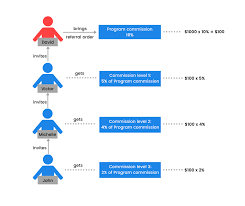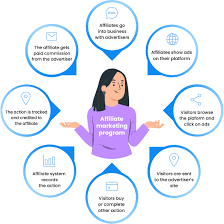
Affiliate Marketing vs. Network Marketing: Which is Right for You?
Regarding making money online, two popular business models are affiliate marketing and network marketing. While they may seem similar initially, the two have significant differences. This article will explore these differences and help you determine your choice.
What is Affiliate Marketing?
Affiliate marketing is a business model where you promote other people’s products or services and earn a commission for every sale you generate. You don’t need to create a program or product or handle customer support. Instead, you focus on driving traffic and sales to the products or services you promote.
One of the benefits of affiliate marketing is that you can promote a wide range of products across digital platforms in multiple niches to multiple affiliates. This means you can promote products to niche audiences that align with your interests and expertise. Additionally, you can work from anywhere in digital marketing and set your schedule.
However, one potential drawback of affiliate marketing is how much revenue you have to depend on the products or services you promote. In addition, your income could be affected if the company you promote goes out of business or its parent company stops offering commissions.
What is Network Marketing?
Network marketing, or multi-level marketing (MLM), is a business model where you earn money by selling products and recruiting others to do the same. In network marketing, you typically join a company and become a distributor of their products. You then earn a commission for every sale and a percentage of the sales made by the people you recruit.
One of the benefits of network marketing is the potential for passive income. As your team grows, you can earn money from their direct sales and your direct communication. Additionally, many network marketing companies offer training and support to help you succeed.
However, the network and affiliate marketing industry is often associated with pyramid schemes and can have a negative reputation. Additionally, many network and affiliate marketing companies require you to purchase products or pay fees to join an affiliate marketing network, which can be a barrier to entry.
Which is Right for You?
When deciding between affiliate marketing and network marketing, it’s essential to consider your goals, interests, and resources. For example, affiliate marketing may be better if you enjoy promoting products and want the freedom to choose what you promote. On the other hand, if you enjoy working with a team and want the potential for passive income, network marketing may be a better fit.
It’s also essential to research the companies you are considering and ensure they have a good reputation. Look for companies with business owners with a proven track record of success and a commitment to ethical business practices.
In conclusion, affiliate and network marketing offer opportunities to make money online. However, they significantly differ in the business model, income, potential customers, and reputation. You can determine the right choice by considering your goals and resources.

Choosing between affiliate marketing and network marketing
When choosing between an affiliate system of marketing strategies and a network of marketing strategies, it’s essential to understand the differences. While both models rely on individuals promoting products and earning commissions, there are significant distinctions in how they operate and the potential benefits and drawbacks of each.
Affiliate marketing is a form of online referral marketing where individuals earn commissions for promoting other people’s products or services.
This can involve sharing affiliate links on social media, writing product reviews, or creating content around a particular topic or niche. As an affiliate link affiliate marketer, you don’t need to make your products or hold inventory – you promote other people’s products and earn a commission when someone purchases through your affiliate link or referral link as above.
One significant advantage of affiliate marketing is its flexibility. You can promote a wide range of products across different niches, and you’re not limited to a specific company or brand.
This marketing strategy means you can diversify your income streams and focus on only promoting brands and products that align with your interests or expertise. Additionally, an affiliate marketing program is relatively low-risk – you don’t need to invest much money upfront, and there’s no need to handle customer service or shipping.
However, there are also some drawbacks to consider. As an affiliate marketer, you don’t have any control over the products you promote or the customer experience. This means that if a product turns out to be poor quality or the customer has a bad experience, it can reflect poorly on you as the affiliate marketer.
Additionally, commissions from affiliate marketing businesses on sales of mobile apps can be relatively low compared to other forms of online business, and there’s a lot of competition in the affiliate sales and marketing space.
On the other hand, network marketing involves promoting and selling products through a network of distributors or team members. This is often referred to as multi-level marketing (MLM) and consists of earning commissions from your sales and the sales made by people you’ve recruited into the business.
As you build a team, you can earn passive income and potentially save money to scale your earnings beyond what you could achieve on your own.

One significant advantage of network marketing is the community and support it provides. When you join a network marketing company, you’re often given access to training, resources, and a network of other distributors who can help you grow your business.
Additionally, the potential for passive income can be a significant draw, as you can earn commissions from the efforts of others on your team.
However, there are also some potential drawbacks to consider. For example, network marketing has a reputation for being associated with pyramid schemes or scams, so it’s essential to choose a reputable company and product.
Additionally, many network marketing companies require you to purchase products or pay fees upfront, which can be a significant financial commitment. Finally, the success of your small business can be highly dependent on your ability to recruit and build a team, which can be challenging for some people.
Ultimately, choosing between the affiliate marketing approach for small businesses and network marketing will depend on your goals, interests, and resources. However, you can decide which small business’ model suits you by understanding the critical differences between the two models.

How Does Multi-Level Marketing Work?
In an MLM business, distributors are encouraged to recruit more distributors and build a downline. When a distributor recruits someone new, they become part of their downline. The distributor earns a commission on the products sold by the recruit and the recruits they bring in.
MLM companies typically have a pyramid structure, with the individuals at the top earning the commission payouts most money. As the downline grows, the distributor at the top earns a commission on the sales made by everyone in the downline.
The Benefits and Drawbacks of Multi-Level Marketing
There are several benefits to multi-level marketing. MLM allows individuals to start their small businesses with low startup costs. Distributors can work from home and set their hours, giving them flexibility and complete control over their work-life balance. MLM businesses also provide distributors with training and support to help them succeed.
However, there are also several drawbacks to multi-level marketing efforts. MLM affiliate software companies are often criticized for their pyramid structure and the pressure to recruit more distributors. Many top MLM affiliate software companies also require distributors to purchase products for remaining active in affiliate programs, leading to inventory management issues and additional expenses. The success rate of many top MLM programs and affiliate software participants’ businesses is also low, with many distributors failing to earn a substantial income.
How to Succeed in Multi-Level Marketing
To make small businesses succeed in multi-level marketing, distributors must be committed to their small businesses and willing to put in the effort. In addition, distributors and small businesses should focus on building customer relationships and providing excellent customer service. Finally, recruiting new distributors who are committed and motivated to see their small businesses grow and succeed is also essential.
In addition, distributors should take advantage of the training and support provided by the MLM company. Attend company events and conferences, read books and articles about MLM, and learn from successful distributors in the industry.
Multi-level marketing can be a lucrative business opportunity for individuals willing to put in the effort. However, it’s essential to be aware of the drawbacks and to approach MLM affiliate program and programs with a realistic mindset. Distributors can succeed in this industry by building relationships with potential affiliates, recruiting committed distributors, and taking advantage of the training and support provided by individual affiliates of the same MLM network or company.

How to Promote Affiliate Products: A Comprehensive Guide
Affiliate marketing is an excellent way to make money online, and promoting affiliate products can be a lucrative business if done correctly. This comprehensive guide for affiliate marketers will explore the most effective ways to promote affiliate products and maximize your earnings.
1. Choose the Right Affiliate Products
The first step in promoting your own affiliate program, business website traffic, and products is choosing the right products to promote your affiliate program and website. You should focus your affiliate program on products that align with your niche and have a high demand in the market. You can use an affiliate program or networks like ClickBank, Commission Junction, or Amazon Associates to find the right products for your niche.
2. Understand Your Audience
Understanding your audience is crucial to promoting affiliate products effectively. First, you need to know what your target audience is interested in and what products they seek. Then, you can use tools like Google Analytics or social media analytics to gather information about your audience’s preferences and behavior.
3. Create High-Quality Content
Creating high-quality content is essential to promoting affiliate products. You need to create content marketing that provides value to your audience and showcases the benefits of the products you are promoting. Many affiliate marketers can create content to encourage potential customers, like blog posts, videos, infographics, or product reviews.
4. Build Your Email List
Building an email list is a great way to promote your affiliate or marketing partner’s products. You can offer a first lead generation or magnets like an e-book or a free course to incentivize your audience to sign up for your email list. Once you have a substantial email list, you can promote your other affiliate business partners’ products through email marketing campaigns.
5. Leverage Social Media
Social media is a powerful tool to promote affiliate products. Become social media influencers for affiliates. You can use social media platforms for companions, like Facebook, Twitter, or Instagram, to share your content and promote your affiliate products. In addition, you can make social media posts about affiliates and run social media advertising campaigns to reach a wider audience for a companion you.
6. Use SEO Techniques
SEO techniques can help your content rank higher on search engines like Google. You must optimize your content with relevant keywords, meta descriptions, and title tags. You can also use backlinks to improve your website’s authority and credibility.
7. Offer Bonuses
Offering bonuses to your audience can be an excellent way for affiliate marketers to generate leads, encourage customers, and incentivize them to buy the products you promote on the affiliate website. For example, with affiliate marketing success, you can provide your audience exclusive discounts, e-books, or other valuable resources to encourage them to purchase affiliate products.
CoopBusiness is a revolutionary cooperative business-building platform that empowers individuals to become entrepreneurs, business owners, and financially independent.
As a member, you’ll receive top-level business mentorship, access to our proprietary business systems, and the opportunity to access the funds you want to turn your business ideas into reality.